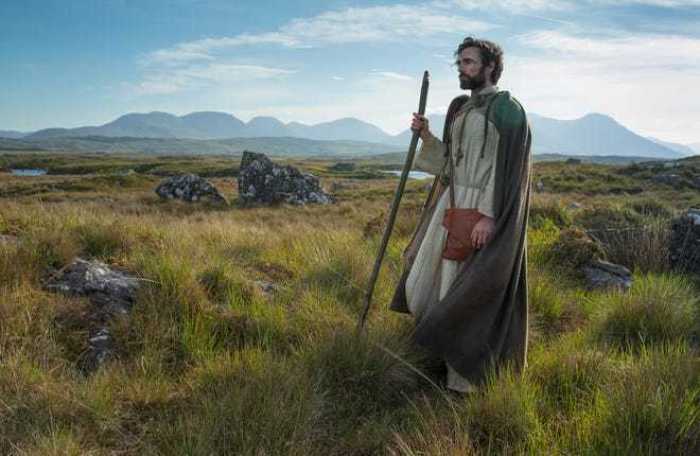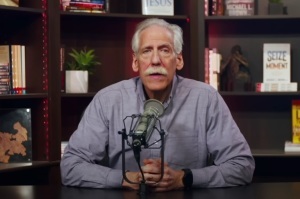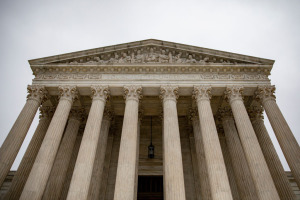St. Patrick's Day: John Rhys-Davies film highlighting life, ministry of Ireland's saint hits theaters

UPDATE MARCH 17: Due to the coronavirus, the release of "I am Patrick" has been postponed. In a statement to The Christian Post, Fathom Events said: "Given current circumstances and to ensure the health and safety of our attendees, 'I Am Patrick' has been postponed. New event dates and ticketing information will be communicated when they become available. We apologize for the inconvenience and thank you for understanding.”
NASHVILLE — The name “St. Patrick” is commonly associated with green beer, shamrocks, and deeds such as casting the snakes out of Ireland.
But few know the incredible true story behind the indomitable man credited with singlehandedly bringing Christianity to Ireland.
Hitting theaters on St. Patrick’s Day, March 17, the new docudrama "I Am Patrick: The Patron Saint of Ireland” sheds new light on the life, ministry, and incredible sacrifices of St. Patrick.
“By the end of the movie, you're going to know Patrick. You're going to know what his life was like, and you're going to hear it in his own words,” Executive Producer Gordon Robertson told The Christian Post. “I want to change everyone’s perception of St. Patrick. I want them to meet the man behind the legend.”
“We’ve gotten lost in the Shamrock; St. Patrick’s Day has become a cultural thing as opposed to, why do we celebrate this day on March 17? Most people don't know that it was established to commemorate the day of Patrick's death. It was originally a day to honor and to remember and to grieve a great man of God who had been taken. We’ve gotten away from that.”
Starring "Lord of the Rings" star John Rhys-Davies, "I am Patrick" digs past legend and myth to tell the story of the famed missionary using historical reenactments, expert interviews, and Patrick’s own letters and writings, including The Confession of St. Patrick and Letter to Coroticus.
Through a series of flashbacks, viewers meet Patrick in 5th century Britain, where he is living a comfortable life as the son of a government official. Despite being part of the Roman Catholic Church, his faith didn’t mean anything to him until he was kidnapped by pirates at the age of 16 and enslaved in Ireland.
For six years, Patrick was forced to work as a shepherd in perilous conditions. During this time, Patrick’s faith was strengthened, serving as a source of sustenance and encouragement. Through divine intervention, Patrick managed to escape slavery and was reunited with his family in Britain. However, it was there he experienced a prophetic dream calling him to take Christianity back to the land of his captivity.
Against the wishes of his family and the Church, Patrick returned as a missionary bishop to Ireland, where he converted thousands to Christianity.
“God spoke to him and told him to become a missionary to the very people who once enslaved him,” Robertson said. “I think the film really does a great job of portraying how hard it was for Patrick, based on what he wrote in the ‘Confession,’ to leave his mother, to leave his father, to leave his position, to leave all that he knew, to go back to the very people who had persecuted him.”
During his ministry, Patrick spoke out against sex trafficking, slavery, and other forms of evil, all in the name of Jesus. Yet despite his mission work, he faced tremendous backlash from an unlikely group of people — his fellow Christians.
“Patrick didn’t preach in Latin; he preached in the Irish language. So when he goes to preach the Gospel, he's not speaking some foreign tongue. He's speaking what they speak. That was unusual for that time period and upset Christian leaders,” Robertson shared. "He reasoned with their culture, which reflected the ministry of St. Paul in the New Testament."
“And the second thing he did, which St. Paul also did, was from the converts, he would make ministers. So instead of importing an educated priest from Europe, Rome, or Britain, he would ordain from the converts he had just made. He would go to a village, raise up a congregation, and then, during that process, be training the person who would take over. And then he would go to another village and do the same thing. This upset Christian leaders."
Patrick’s contributions to modern society are notable, Robertson said, pointing out that anyone of Scottish or Irish descent owes both their Christianity and education to the missionary.
“He didn’t just stop with sharing the Gospel. He wanted to teach them how to read and write so that they could read the Bible on their own, which, again, was novel and completely different,” Robertson explained. “The networks of monasteries that he started, which were to train priests on how to read and write, led to what we now call the university. They became centers of learning, they became the place for education. And for centuries, the primary purpose of education was so you could read the Bible.”
Notably, Patrick refers to himself as “Patrick, a sinner” in his writings. This acknowledgment of personal failings, Robertson said, is something the modern Church would do well to emulate.
“I think to a degree you can accuse American Christianity of being therapeutic Christianity, or therapeutic theology: What are the steps I need to follow in order to become a better person? But Patrick’s whole identity was, ‘I am a sinner,’ following the example of St. Paul.”
“Christ came into the world to save sinners,” Robertson continued. “That's an identity that I think we should all have but we've all missed the mark. We've all fallen through our sin. Yet Jesus has shown us a way out, and that's the essence of the good news. The essence of Patrick's message is the essence of Paul's message, which is the essence of the Gospel.”
Although Patrick lived several thousand years ago, his mission and example is one that modern-day Christians can learn from, he said.
“Patrick didn’t pull any punches. He was one of the first Christians to ever take a stand against slavery, against sex trafficking— all things we’re still battling today. These things aren’t just a problem in some remote areas of the world; they’re problems right here in America. I think we need to be re-inspired by St. Patrick to take a stand.”
Patrick’s remarkable life is evidence that “God still speaks today,” Robertson said, adding, “If you do what Patrick did, spend time in prayer and with God, He will speak to you. And if you’re willing to obey what He asks you to do, incredible things can happen.”
From CBN Documentaries and Director Jarrod Anderson, “I Am Patrick” also stars Robert McCormack as Young Patrick. The film is in movie theaters nationwide March 17 and 18 only. Visit FathomEvents.com for tickets, locations and showtimes.





























